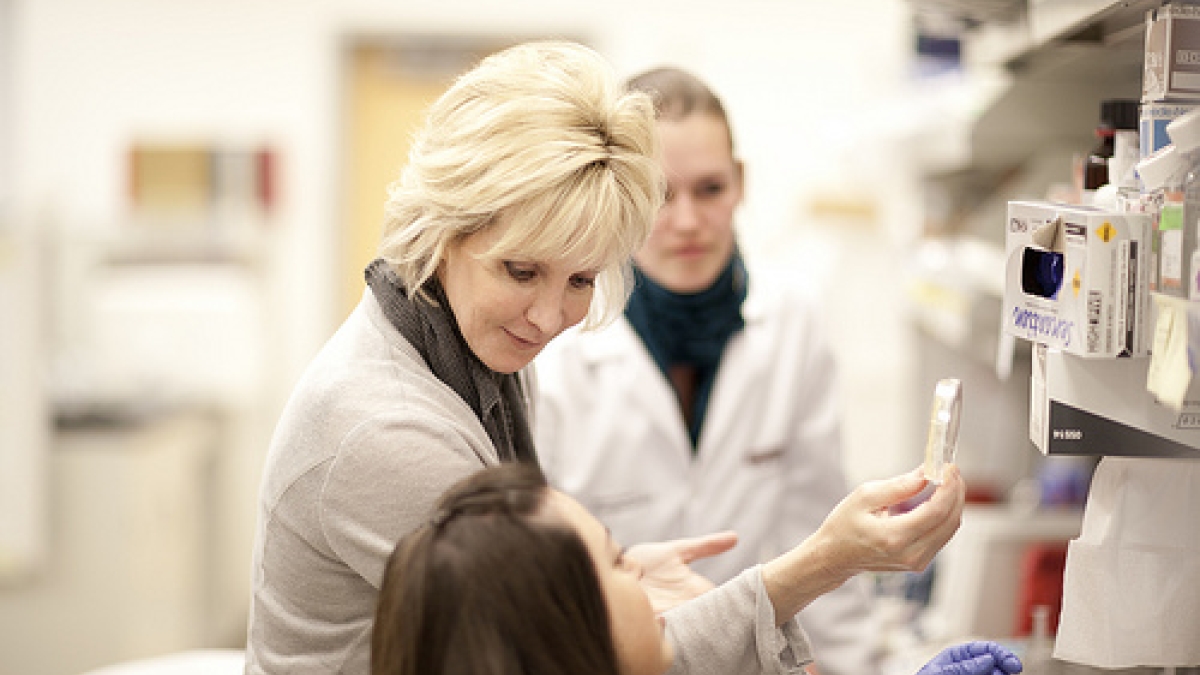Nickerson named finalist for research excellence award

Arizona State University’s Cheryl Nickerson has been selected as one of four finalists for the Arizona BioIndustry Association’s Award for Research Excellence. The 2011 recipient will be recognized at an awards dinner at the Sheraton Wild Horse Pass in Chandler, Ariz., on Oct. 13.
Prompting her nomination was Nickerson’s pioneering research into the responses of cells to the unique microgravity environment of spaceflight. She is internationally recognized for her use of the microgravity environment as an innovative biomedical research platform to provide new insights into the host-pathogen interaction that leads to infectious disease. Her findings are leading to better ways to protect astronauts during manned missions and hold exciting potential for development of new vaccines and therapeutics to prevent infectious diseases on Earth.
“There are conditions that are encountered by pathogens during the infection process in the human body that are relevant to conditions that these same organisms experience when cultured in spaceflight. By studying the effect of spaceflight on the disease-causing potential of major pathogens like salmonella, we can provide insight into infectious disease mechanisms that cannot be attained using traditional experimental approaches on Earth, where gravity can mask key cellular responses,” says Nickerson, a professor in the School of Life Sciences, in the College of Liberal Arts and Sciences, and a researcher in ASU’s Biodesign Institute Center for Infectious Diseases and Vaccinology.
Landmark spaceflight experiments aboard the NASA Space Shuttle and International Space Station have placed Nickerson’s work at the forefront of the field of cellular biomechanics, which is the study of physical forces on living cells and how this response is related to disease. Her multidisciplinary research focuses on microbial and human cellular responses to the physical forces of fluid shear and gravity. Minimizing these forces in microgravity creates an environment that is relevant to that encountered by pathogens during the natural infection process in the host and also for human cells during their natural development into functional tissues.
Nickerson’s approach has elucidated previously undetected cellular and molecular mechanisms of infectious disease, which were masked by the forces associated with gravity on Earth. Her groundbreaking discoveries include unique changes in the disease-causing potential of microbial pathogens and the development of advanced 3-D models of human tissues as high fidelity tools for infectious disease studies and drug and therapeutic development. These findings have resulted in a paradigm shift in how we view the infection process from the host-microbe perspective.
“It is exciting to me that our work to discover how to keep astronauts healthy during spaceflight is translating into novel ways to prevent diseases here on Earth,” Nickerson says.
Nickerson has a long and productive relationship with the U.S. space program. She has been a scientific consultant for the NASA Life Sciences Program since 1998 and was an astronaut candidate finalist in 2004. She received the Presidential Early Career Award for Scientists and Engineers in 2001 at the White House and has testified before Congress for NASA.
This summer, Nickerson was awarded NASA’s prestigious Exceptional Scientific Achievement Medal. She has trained more than 40 students, published more than 55 peer-reviewed articles and book chapters, holds six patents, and has obtained millions of dollars in research grants. She led an unprecedented effort to obtain a Space Act Agreement between NASA and ASU for routine access to the ISS research platform for collaborative spaceflight biosciences/biotechnology investigations.
For more information about the awards dinner, visit www.azbioexpo.com.
About Arizona BioIndustry Association
The Arizona BioIndustry Association is comprised of organizations in business, research, government and other professions involved in the biosciences. The association provides access to key resources, connections and information that support the industry’s ability to be a thriving sector for the state.